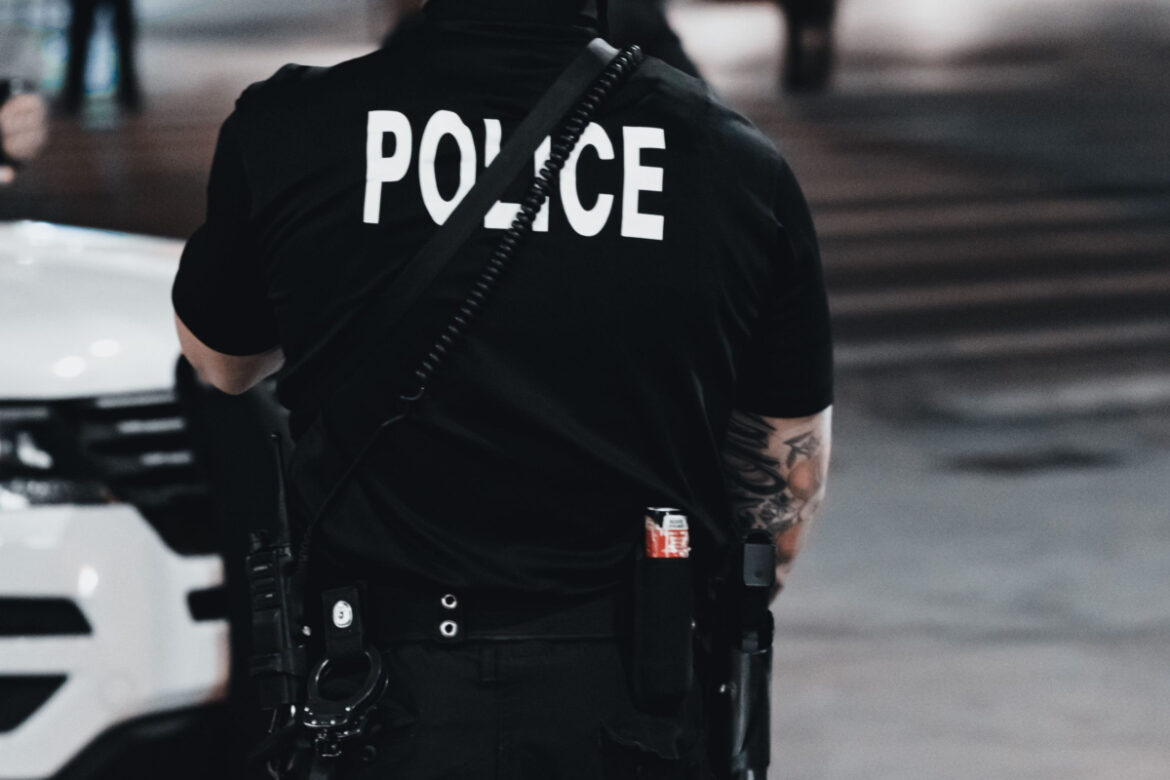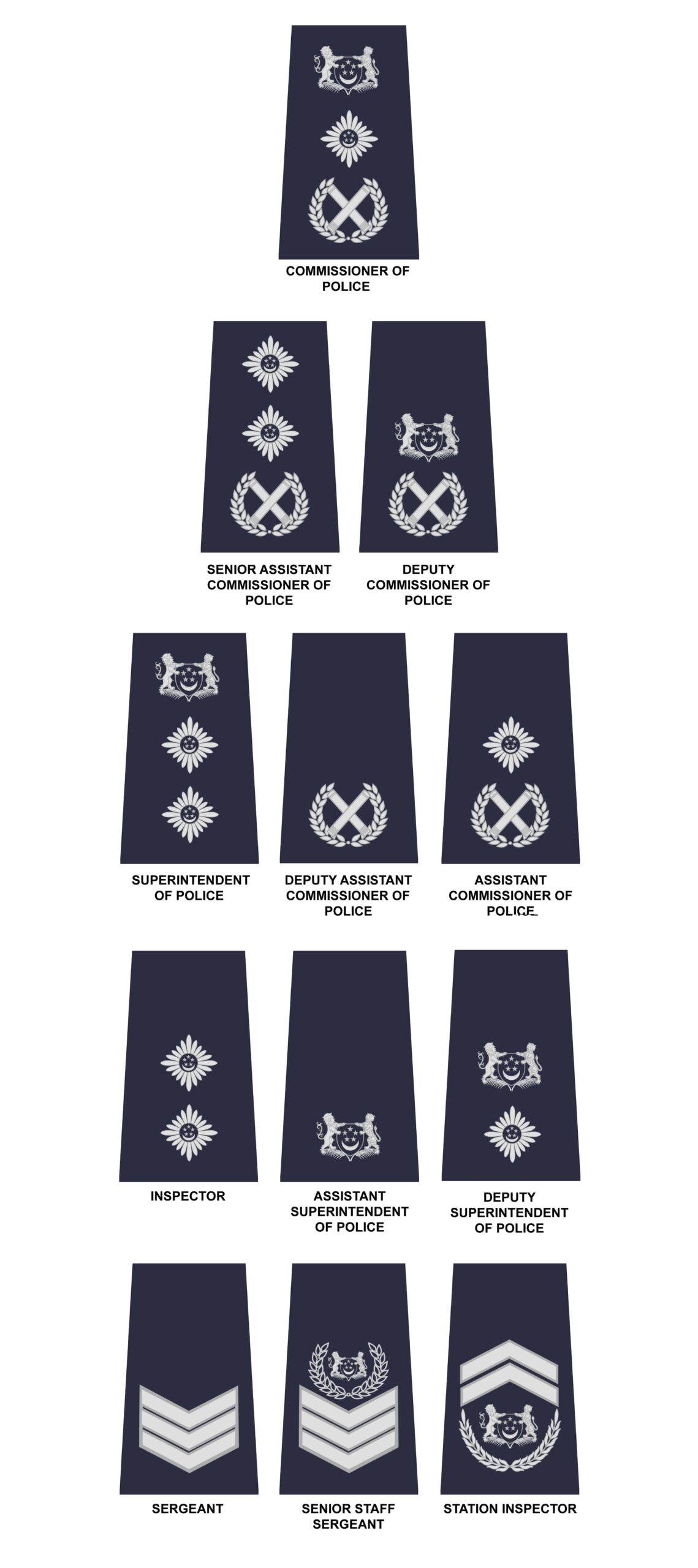

SPF Ranks
Overview
The ranks within the Singapore Police Force (SPF) are a hierarchical structure that allows for efficient command and control within the organisation. These ranks represent various levels of authority, responsibility, and expertise. This overview provides a comprehensive understanding of the key Singapore Police Force ranks.
Commissioner of Police (CP)
The Commissioner of Police holds the highest rank within the SPF. This position is responsible for leading and overseeing all aspects of policing in Singapore, including formulating policies, managing operations, and ensuring public safety.
Deputy Commissioner (DC)
Deputy Commissioners serve as second-in-command to the Commissioner of Police. They assist in providing leadership and guidance to other senior officers while playing a pivotal role in strategic planning and decision-making processes.
Senior Assistant Commissioners (SAC)
Senior Assistant Commissioners hold significant leadership positions within the SPF. They oversee major departments or units at both national and divisional levels. Their responsibilities include policy formulation, resource allocation, personnel management, and the implementation of operational strategies.
Assistant Commissioners (AC)
Assistant Commissioners play critical roles in specific functional areas or specialised units within the SPF. They are responsible for directing day-to-day operations, managing resources effectively, liaising with relevant stakeholders, such as government agencies or community organisations, and ensuring effective law enforcement outcomes.
Superintendents (SUPT)
Superintendents lead district-level police divisions, or subdivisions. They are responsible for maintaining law and order within their respective jurisdictions by coordinating crime prevention efforts, handling investigations when necessary, managing resources efficiently, and mentoring subordinate officers collectively known as Inspectors (INSP), Sergeants Major I-A (SM1A), and Sergeants Major II-B (SM2B).
Inspectors (INSP)
Inspectors primarily work alongside sergeants on frontline duties such as patrolling neighbourhoods or investigating crimes if required by station chiefs. They hold supervisory roles over Sergeant Majors (MAJ) and Sergeants (SGT), ensuring that their subordinates carry out their duties professionally and effectively.
Senior Staff Sergeant Majors I-A (SM1A) and II-B (SM2B)
Senior Staff Sergeants Major I-A (SM1A) and Staff Sergeant Major II-B (SM2B) hold important leadership positions within specific departments or specialised units. They are responsible for task execution, training and development of junior officers, and managing day-to-day operations under the guidance of inspectors (INSP). Additionally, they take on roles such as extending intelligence gathering capabilities, community engagement initiatives to strengthen relationships with residents, or collaborative efforts with various stakeholders.
Sergeants (SGT)
Sergeants perform a mix of operational and supervisory roles. They serve as mentors to constables while also assisting senior officers in maintaining law and order within their respective areas of responsibility. They are typically responsible for guiding frontline officers during patrols, traffic management, crowd control situations, search operations, or major events.
Corporals (CPL)
Corporals play an essential role in supporting team leaders during daily policing activities. Their duties include assisting sergeants with administrative tasks, providing guidance to junior constables if necessary after regular hours, or providing immediate supervision in a particular scenario.
Constables
Constables form the largest group within the SPF. They are responsible for carrying out day-to-day patrol duties, maintaining law and order, attending to emergencies promptly, facilitating investigations by collecting evidence, gathering witness statements, operating police resources efficiently like emergency vehicles, maintaining police presence at public events, etc.
The Singapore Police Force ranks have been designed to establish an effective chain of command while promoting accountability and professionalism among its officers. Each rank carries specific responsibilities that contribute to maintaining peace, safeguarding public safety, combating crime, and serving the community effectively.
Commissioner of Police
Overview
The Commissioner of Police is the highest-ranking officer in the Singapore Police Force (SPF) and holds the ultimate authority and responsibility for maintaining law and order within Singapore. This position plays a crucial role in ensuring public safety, preventing crime, and leading and overseeing various strategic initiatives to combat both local and transnational criminal activities.
Responsibilities
As the head of SPF, the Commissioner of Police has a wide range of responsibilities that contribute to the effective functioning of law enforcement in Singapore. These include:
Policy Formulation: The Commissioner is responsible for formulating strategies, policies, and operational plans to maintain public safety and prevent crime.
Leadership: As a leader within SPF, the Commissioner provides guidance and direction to all police officers under their command through regular communication channels such as briefings, meetings, or memos.
Resource Management: Ensuring efficient allocation of resources—including personnel, budgetary provisions, equipment, and technology—to effectively address emerging challenges faced by the police force.
Public Relations: The Commissioner is tasked with fostering positive relationships between SPF and various stakeholders, including government agencies, community leaders, media outlets, and international law enforcement counterparts.
Oversight and Accountability: Holding overall responsibility for maintaining high standards of professionalism among officers while emphasising integrity, transparency, and accountability throughout SPF's operations.
Qualifications and Selection Process
To be considered for appointment as the Commissioner of Police in Singapore:
A candidate must have at least 25 years' experience serving within SPF or other related law enforcement agencies.
The candidate should possess an excellent track record demonstrating strong leadership qualities along with proficiency in organisational management.
Additionally, candidates are required to undergo selection processes, which may include interviews or assessments conducted by an appointed panel comprising senior government officials from relevant ministries.
Rank Insignia
The commissioner's rank insignia serves as a visual representation of their position of authority within the SPF. A five-pointed silver star on their shoulder epaulettes serves as a visual cue to the highest rank in the Singapore police force, which is Commissioner of Police.
The position of Commissioner of Police within the Singapore Police Force carries significant responsibility and plays a crucial role in maintaining law and order across the nation. With a focus on strategic planning, leadership, and resource management, the Commissioner ensures that Singaporean citizens live in a safe environment while fostering community partnerships to address crime prevention effectively.
SPF Ranks Superintendent of Police
Overview
The rank of Superintendent of Police is one of the highest-ranking positions within the Singapore Police Force (SPF). In this overview, we will explore the duties, responsibilities, and qualifications required for individuals to hold this esteemed position.
Duties and responsibilities
As a superintendent of police, an individual plays a crucial role in overseeing and managing various aspects related to law enforcement. Some key duties and responsibilities include:
Leadership: Superintendents are responsible for leading a team within their respective divisions or units. They provide guidance, motivation, and support to the officers under their command.
Operational Planning: They are involved in formulating strategic plans for crime prevention initiatives and maintaining public order.
Law Enforcement: Superintendents actively participate in carrying out investigations into major crimes or complex cases. They ensure that investigations are conducted properly according to established protocols.
Community Engagement: Building rapport with the community is another vital aspect of a superintendent's role. This involves attending community events, conducting outreach programmes, and addressing concerns raised by residents.
Policy Implementation: Superintendents are responsible for implementing policies set forth by higher authorities effectively. They monitor compliance among officers under their command.
Qualifications
To qualify for the rank of Superintendent of Police in Singapore, candidates must fulfil certain requirements:
Education: A bachelor's degree from a recognised university is typically required. The field of study does not necessarily have to be related to law enforcement, but it should be relevant.
Work Experience: Candidates should have prior experience working as assistant superintendents with proven competence in leadership and law enforcement skills.
Physical Fitness: Physical fitness is essential for police officers at all ranks, including superintendents. Candidates will need to meet specific physical standards during the selection process.
Career Progression
The path towards becoming a superintendent follows a gradual progression within the SPF. Here is a brief overview of the career advancement process:
Police Officer (entry-level position)
Senior Police Officer
Inspector
Assistant Superintendent
Superintendent of Police
The exact duration and requirements for each rank may vary based on individual performance, qualifications, and vacancies available.
A Superintendent of Police in the Singapore Police Force holds a significant position of authority and responsibility within the organisation's hierarchy. They are entrusted with maintaining law and order, ensuring public safety, and managing police operations effectively.
It is crucial for aspiring superintendents to possess strong leadership skills, relevant educational qualifications, substantial work experience in law enforcement, and maintain high physical fitness levels throughout their career progression.
By diligently fulfilling these requirements and gaining practical experience within the SPF's ranks, individuals can aim to attain this prestigious rank while contributing to keeping Singapore safe and secure.
SPF Ranks Sergeant
Overview
A sergeant is a rank within the Singapore Police Force (SPF) and holds an important position in ensuring public safety and maintaining law and order. In this overview, we will discuss the role, responsibilities, and key aspects of being a sergeant in the SPF.
Role
Sergeants play a critical role within the SPF hierarchy, as they are responsible for overseeing police operations at various levels. They act as team leaders, managing a group of officers under their command. Their main objective is to ensure efficient and effective execution of day-to-day tasks while upholding the principles of justice and integrity.
Responsibilities
The responsibilities of a sergeant encompass both administrative duties and operational activities. Some key responsibilities include:
Supervision: As team leaders, sergeants supervise their subordinates by providing guidance, conducting briefings, delegating tasks, monitoring progress, and assessing performance.
Enforcement: Sergeants actively participate in law enforcement activities such as conducting patrols, responding to emergency calls, investigating crimes or incidents, and making arrests if necessary.
Training: They are involved in training new recruits or fresh constables by imparting knowledge on laws, regulations, and procedures to ensure proper understanding before they join active duty.
Mentoring: Sergeants provide mentorship to junior officers by fostering professional growth through advice on improving skills or techniques required for effective policing.
Community Engagement: They act as representatives of the SPF when engaging with community members through outreach programmes or attending public events to enhance positive relations between the police force and civilians.
Career Progression
Starting off as police officers upon completing their basic training at the Home Team Academy (HTA), individuals can aim to progress from constable all the way up to several ranks, including inspector, where they may eventually become superintendents or even higher-ranking officials.
To attain promotions within this hierarchy, i.e., becoming sergeants, various factors are taken into account, such as performance appraisal, experience, leadership abilities, and passing relevant examinations. Promotion opportunities usually open up based on vacancies and the availability of higher-ranking positions.
Qualifications
To be eligible for promotion to the rank of sergeant within the SPF, there are certain criteria that need to be fulfilled:
Experience: Police officers typically require a minimum of around five years' service before they can apply for promotion to sergeant.
Skills: A range of skills, including strong communication, problem-solving ability, teamwork, and adaptability to different situations, will prove crucial in fulfilling the role effectively.
Knowledge: Demonstrating sound knowledge of police procedures, legal frameworks, and recent developments and trends in criminal activities is highly beneficial.
Leadership Potential: The ability to lead a team professionally is essential at this level; individuals must showcase their potential through previous experiences or training exercises.
Sergeants hold an important position within the Singapore Police Force by being responsible for managing teams and ensuring effective law enforcement efforts. They play a pivotal role in maintaining public safety while working closely with fellow officers and engaging with local communities. With further experience and demonstrated capabilities, sergeants have the opportunity for career progression within the SPF hierarchy towards more senior leadership roles.